October 10 to Ocotber 18 - abbey
Main menu:
- Home Page
- Abbey
- Apiary
- Documents
- Monastic
- Spirituality
- Apostleship of the Sea
- Homilies of Pope Francis
October 10 to Ocotber 18
 “We receive God Himself when we pray courageously”
“We receive God Himself when we pray courageously”
In prayer we must be courageous and discover the true grace that is given us: God Himself. That was the Pope’s message at Thursday October 10. At the heart of the homily was Jesus’ insistence, in the day’s Gospel, that we pray with trusting insistence. The parable of the importunate friend, the friend who obtains what he desires thanks to his insistence, gave Pope Francis the opportunity to reflect on the quality of our prayer.
“This makes us think, in our prayer: how do we pray? Do we pray like this, out of habit, piously but unbothered, or do we put ourselves forward with courage before the Lord to ask for the grace, to ask for what we’re praying for? Courage in prayer: a prayer that is not courageous is not a real prayer. The courage to trust that the Lord listens to us, the courage to knock on the door . . . The Lord says: ‘For everyone who asks, receives; and the one who seeks, finds; and to the one who knocks, the door will be opened.’ But you have to ask, seek, and knock.
Do we get ourselves involved in prayer; do we know to knock at the heart of God? In the Gospel Jesus says, “If you then, who are wicked, know how to give good gifts to your children, how much more will the Father in heaven give the Holy Spirit to those who ask him?” This, is a great thing. When we pray courageously, the Lord gives us the grace, but He also gives us Himself in the grace: the Holy Spirit, that is, Himself! The Lord never gives or sends a grace by mail: never! He brings it Himself! What we ask for is a little bit like [laughing] . . . it is the envelope that grace is wrapped in. But the true grace is Him, Who comes to bring it to me. It’s Him. Our prayer, if it is courageous, receives what it asks for, but also that which is more important: the Lord.”
In the Gospel, some people receive the grace and then go away: of the ten lepers healed by Jesus, only one returned to thank him. Even the blind man of Jericho found the Lord in the healing, and praised God. But we must pray “with the courage of faith”, prompting us to ask even for those things that prayer does not dare hope for — that is, God Himself.
We ask for a grace, but we don’t dare say, 'But come Yourself to bring it to me.' We know that a grace is always brought by Him: It is He Himself who comes and brings it to us. Let us not embarrass ourselves by taking the grace and not recognizing Him who brings it to us, Him who gives it to us: The Lord. That the Lord may give us the grace of giving us Himself, always, in every grace. And that we might recognize Him, and that we might praise Him as did the sick people in the Gospel who were healed. So that, in that grace, we might find the Lord.
“Guard against deceit of the devil”
“Christians must always guard against the deceit of the devil”, said Pope Francis at Mass on Friday, October 11. The Pope underlined that Christians cannot follow the victory of Jesus over evil “halfway”, nor confuse or relativize truth in the battle against the devil. The Pope focused his homily on the day’s Gospel and immediately underlined “there is always the temptation to want to diminish the figure of Jesus, as if he were “a healer at most” and so as not to take him ‘so seriously’. It is an attitude, that has “reached our present day”.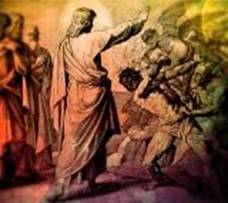
There are some priests who, when they read this Gospel passage, this and others, say: ‘But, Jesus healed a person with a mental illness’. They do not read this, no? It is true that at that time, they could confuse epilepsy with demonic possession; but it is also true that there was the devil! And we do not have the right to simplify the matter, as if to say: ‘All of these (people) were not possessed; they were mentally ill’. No! The presence of the devil is on the first page of the Bible, and the Bible ends as well with the presence of the devil, with the victory of God over the devil.
For this reason, we should not be naïve. The Lord gave us certain criteria to ‘discern’ the presence of evil and to follow the ‘Christian way’ when there are temptations. One of the criteria is ‘not to follow the victory of Jesus’ only ‘halfway’. “Either you are with me”, says the Lord, “or you are against me.” Jesus, came to destroy the devil, to give us the freedom from the enslavement the devil has over us. And, this is not exaggerating. On this point, there are no nuances. There is a battle and a battle where salvation is at play, eternal salvation; eternal salvation… of us all.
There is the criterion for watchfulness: We must always be on guard, on guard against deceit, against the seduction of evil. And we can ask ourselves the question: Do I guard myself, my heart, my feelings, my thoughts? Do I guard the treasure of grace? Do I guard the presence of the Holy Spirit in me? Or do I let go, feeling secure, believing that all is going well? But if you do not guard yourself, he who is stronger than you will come. But if someone stronger comes and overcomes, he takes away the weapons in which one trusted, and he shall divide the spoil. Vigilance!
Three criteria! Do not confuse the truth. Jesus fights the devil: first criterion. Second criterion: he who is not with Jesus is against Jesus. There are no attitudes in the middle. Third criterion: vigilance over our hearts because the devil is astute. He is never cast out forever. It will only be so on the last day. When the impure spirit leaves man, it wanders in deserted places, and seeking rest and finding none, says: ‘I will return to my house, from which I left.” And when he finds it swept clean and adorned, then he goes, takes another seven spirits worse than he, who come and make their homes. And, this way, the last state of man becomes worse than the first.
‘Vigilance,’… because his strategy is this: You became Christian. Advance in your faith. I will leave you. I will leave you tranquil. But then when you are used to not being so watchful and you feel secure, I will come back. The Gospel today begins with the devil being cast out and ends with the devil coming back! St. Peter would say: ‘It is like a fierce lion that circles us’. It is like that. ‘But, Father, you a little ancient. You are frightening us with these things…’ No, not me! It is the Gospel! And these are not lies: it is the Word of the Lord! Let us ask the Lord for the grace to take these things seriously. He came to fight for our salvation. He won against the devil! Please, let us not do business with the devil! He seeks to return home, to take possession of us… Do not relativize; be vigilant! And always with Jesus!”
‘Syndrome of Jonah’ of perfect religiosity OR ‘Sign of Jonah’: Love and mercy?
“You have to fight the ‘Jonah syndrome’ that leads us to think that the hypocrisy of our works are enough to save us”, said Pope Francis at Mass Monday October 14. He warned of an attitude of ‘perfect religiosity,’ which looks at the doctrine of salvation but does not care for the poor people.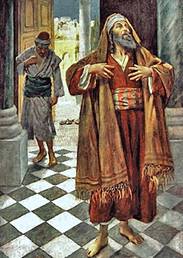 The ‘Jonah Syndrome’ and the ‘sign of Jonah.’ Pope Francis centered his homily on this paradox. “Jesus, in today's Gospel speaks of the ‘wicked generation.’ He used a very strong word. But, he does not refer to people who followed him with so much love, but the doctors of the law who tried to test him and trap him. These people, in fact, asked signs and Jesus answers that they will only be given ‘the sign of Jonah.’ There is, however, the ‘syndrome of Jonah.’ The Lord asked him to go to Nineveh, and he flees to Spain. Jonah said, "I have things very clear": "the doctrine is this, one must do this and let the sinners take care of themselves, I’m leaving." Those who live according to this ‘syndrome of Jonah’,… Jesus calls them hypocrites, because they do not want salvation of the poor people, the ignorant and the sinners.
The ‘Jonah Syndrome’ and the ‘sign of Jonah.’ Pope Francis centered his homily on this paradox. “Jesus, in today's Gospel speaks of the ‘wicked generation.’ He used a very strong word. But, he does not refer to people who followed him with so much love, but the doctors of the law who tried to test him and trap him. These people, in fact, asked signs and Jesus answers that they will only be given ‘the sign of Jonah.’ There is, however, the ‘syndrome of Jonah.’ The Lord asked him to go to Nineveh, and he flees to Spain. Jonah said, "I have things very clear": "the doctrine is this, one must do this and let the sinners take care of themselves, I’m leaving." Those who live according to this ‘syndrome of Jonah’,… Jesus calls them hypocrites, because they do not want salvation of the poor people, the ignorant and the sinners.
The 'Syndrome of Jonah' has no zeal for the conversion of the people, seeking holiness – permit me to use the word - There is a parable in the Gospel, which depicts this aspect very well: that of the Pharisee and publican praying in the temple. The Pharisee, so sure of himself, before the altar thanks God for not being like the publican, who on the contrary only asks for the mercy of the Lord, recognizing that he is a sinner. Here then is that sign that Jesus promises for His forgiveness, through his death and his resurrection, is his mercy ": “I desire mercy and not sacrifice"
There is a parable in the Gospel, which depicts this aspect very well: that of the Pharisee and publican praying in the temple. The Pharisee, so sure of himself, before the altar thanks God for not being like the publican, who on the contrary only asks for the mercy of the Lord, recognizing that he is a sinner. Here then is that sign that Jesus promises for His forgiveness, through his death and his resurrection, is his mercy ": “I desire mercy and not sacrifice"
The sign of Jonah, the truth, is what gives us the confidence to be saved by the blood of Christ. How many Christians, how many there are… , they think they will be saved only for what they do, for their works. The works are necessary, but are a consequence, a response to the merciful love that saves us. But the works themselves, without this merciful love do not serve the purpose. Instead, the 'Jonah Syndrome' has confidence only in its personal justice, in its works. Jesus then speaks of the wicked generation and the pagan Queen of Sheba, who is almost appointed a judge, will stand up against the men of this generation. And this, he pointed out, because she was a restless woman, a woman who sought the wisdom of God.
Behold, the 'Jonah Syndrome' brings us to the hypocrisy, to that sufficiency, to be ‘clean’ Christians, perfect, 'because we do these works: we have kept the commandments, everything. It is a big disease. And the sign of Jonah, that the mercy of God in Jesus Christ, who died and rose for us, for our salvation. There are two words in the first reading that are related to this. Paul says of himself that he is an apostle, not because he has studied this, no: He was called to be an Apostle. And the Christians say: 'Are you called by Jesus Christ.' The sign of Jonah calls us: to follow the Lord, we are all sinners, with humility, meekness. There is a call, even a choice…" We take advantage of this liturgy today and make a choice: What do I prefer? The syndrome of Jonah or the sign of Jonah?
Beware of idolatry and hypocrisy
“Idolatry and hypocrisy do not spare even the Christian life.” Pope Francis put us on guard against both these vices in his homily at Mass Tuesday October 15. “In order not to give in to the dangers of these sins, it is necessary to put into practice the commandments of love of God and love of neighbour.” He said.  Once again, the liturgy of the Mass elicits from Pope Francis a reflection on the traps that punctuate the life of faith: “To become an apostle of one’s own ideas, or a devotee of one’s own well-
Once again, the liturgy of the Mass elicits from Pope Francis a reflection on the traps that punctuate the life of faith: “To become an apostle of one’s own ideas, or a devotee of one’s own well-
But since we all have need to worship – because we have the imprint of God within us – when we do not worship God, we worship creatures. And this is the passage from faith to idolatry. These people, idolaters, have no excuse: because having known God, they have neither glorified nor worshipped Him as God. And what is the way of idolatry? ‘they became vain in their reasoning, and their senseless minds were darkened. The selfishness of their own thoughts, the omnipotent thought, that which I think is true: I think the truth, I make the truth with my thought.
The critics of Saint Paul, two thousand years ago, went to the idolaters who prostrated themselves before reptiles, birds, and four-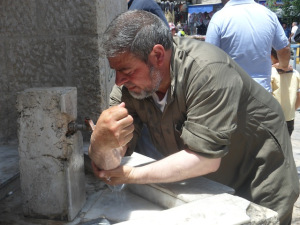 Even today, there are so many idols, and even today there are so many idolaters, so many who think they are wise. But even among us, among Christians, eh? I’m not speaking about them, I respect them, those who aren’t Christians. But among us – we’re speaking within the family – they think they’re wise, they know everything... They’ve become foolish and exchange the glory of the incorruptible God with an image: myself, my ideas, my comforts . . . Today, all of us – I go ahead, eh! It’s not only something historic – even today, along the way there are idols, even a step forward . . . We all have within ourselves some hidden idol. We can ask ourselves, in the sight of God: what is my hidden idol? What takes the place of God?”
Even today, there are so many idols, and even today there are so many idolaters, so many who think they are wise. But even among us, among Christians, eh? I’m not speaking about them, I respect them, those who aren’t Christians. But among us – we’re speaking within the family – they think they’re wise, they know everything... They’ve become foolish and exchange the glory of the incorruptible God with an image: myself, my ideas, my comforts . . . Today, all of us – I go ahead, eh! It’s not only something historic – even today, along the way there are idols, even a step forward . . . We all have within ourselves some hidden idol. We can ask ourselves, in the sight of God: what is my hidden idol? What takes the place of God?”
If Saint Paul calls the idolaters foolish, in the day’s Gospel Jesus says the same thing about the hypocrites, in the person of the Pharisees who are scandalized because the Master hadn’t washed as was the norm before sitting down at table. “You Pharisees!” Jesus replied. “Although you cleanse the outside of the cup and the dish, inside you are filled with plunder and evil. But as to what is within, give alms, and behold, everything will be clean for you.”
Jesus counsels: don’t look at appearances, go by the truth. The plate is the plate, but what is important is what’s on the plate: the meal. But if you are vain, if you are a careerist, if you are ambitious, if you are a person that always puts himself forward or likes to advance yourself, because you think you are perfect, give a little bit of alms and that will heal your hypocrisy. This is the way of the Lord: it is to worship God, to love God above all things and to love your neighbour. It’s so simple, but so difficult! This can only be done with grace. Let us ask for this grace. (Watch Video)
‘Keys in Pocket and closed doors’
If a Christian “becomes a disciple of the ideology, he has lost the faith.” This was the theme of Pope Francis’ homily at Mass Thursday, October 17. The Pope warned Christians against behaving as though the “key is in [their] pocket, and the door closed.” He reiterated that without prayer, one abandons the faith and descends into ideology and moralism. “Woe to you, scholars of the law! You have taken away the key of knowledge!” (Luke 11: 52)
Pope Francis referred to this passage from the Gospel, warning: “When we are on the street and find ourselves in front of a closed Church,” he said, “we feel that something is strange.” Sometimes, “they give us reasons” as to why they are closed: They give “excuses, justifications, but the fact remains that the Church is closed and the people who pass by cannot enter.” And, even worse, the Lord is inside and cannot go out!.(to meet His people) Today, Jesus speaks to us about the image of the [lock]; it is the image of those Christians who have the key in their hand, but take it away, without opening the door. Worse still, they keep the door closed and don’t allow anyone to enter. In so doing, they themselves too do not enter. The “lack of Christian witness does this,” he said, and “when this Christian is a priest, a bishop or a Pope it is worse.” But, the Pope asks, how does it happen that a “Christian falls into this attitude” of keeping the key to the Church in his pocket, with the door closed?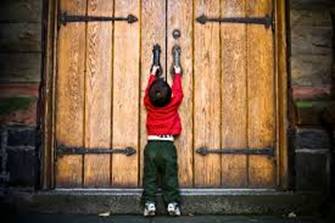 “The faith passes, so to speak, through a distiller and becomes ideology. And ideology does not beckon [people]. In ideologies there is not Jesus: in his tenderness, his love, his meekness. And ideologies are rigid, always. Of every sign: rigid. And when a Christian becomes a disciple of the ideology, he has lost the faith: he is no longer a disciple of Jesus, he is a disciple of this attitude of thought… For this reason Jesus said to them: ‘You have taken away the key of knowledge.’ The knowledge of Jesus is transformed into an ideological and also moralistic knowledge, because these close the door with many requirements.”
“The faith passes, so to speak, through a distiller and becomes ideology. And ideology does not beckon [people]. In ideologies there is not Jesus: in his tenderness, his love, his meekness. And ideologies are rigid, always. Of every sign: rigid. And when a Christian becomes a disciple of the ideology, he has lost the faith: he is no longer a disciple of Jesus, he is a disciple of this attitude of thought… For this reason Jesus said to them: ‘You have taken away the key of knowledge.’ The knowledge of Jesus is transformed into an ideological and also moralistic knowledge, because these close the door with many requirements.”
The Pope continued, Jesus told us: “You burden the shoulders of people [with] many things; only one is necessary.” This, therefore, is the spiritual, mental thought process of one who wants to keep the key in his pocket and the door closed: The faith becomes ideology and ideology frightens, ideology chases away the people, distances, distances the people and distances of the Church of the people. But it is a serious illness, this of ideological Christians. It is an illness, but it is not new, eh? Already the Apostle John, in his first Letter, spoke of this. Christians who lose the faith and prefer the ideologies. His attitude is: be rigid, moralistic, ethical, but without kindness. This can be the question, no? But why is it that a Christian can become like this? Just one thing: this Christian does not pray. And if there is no prayer, you always close the door.
The key that opens the door to the faith, is prayer. When a Christian does not pray, this happens. And his witness is an arrogant witness. He who does not pray is arrogant, is proud, is sure of himself. He is not humble. He seeks his own advancement. Instead, when a Christian prays, he is not far from the faith; he speaks with Jesus. I say ‘to pray’, I do not say ‘to say prayers’, because these teachers of the law said many prayers in order to be seen. Jesus, instead, says: “when you pray, go into your room and pray to the Father in secret, heart to heart.” It is one thing to pray, and another thing to say prayers.”
These do not pray, abandoning the faith and transforming it into moralistic, casuistic ideology, without Jesus. And when a prophet or a good Christian reproaches them, they the same that they did with Jesus: When Jesus left, the scribes and Pharisees began to act with hostility toward him-
Remember elderly priests & sisters in nursing homes, true shrines of holiness.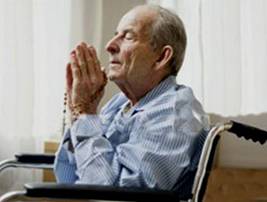 The apostle St Paul has a joyful and enthusiastic beginning but is not spared a decline a ‘sunset’ in his later years and it was a similar situation with Moses and St. John the Baptist. Moses, when young, was the courageous leader of the People of God who fought against his enemies to save his people, and also wrestled with God to save the people..! strong!. But at the end of his life, he is alone on Mount Nebo, looking at the promised land but unable to enter it. In the later life of St. John the Baptist, the apostle had to struggle with an anguish that tormented him and finished under the power of a weak, corrupt and drunken ruler who in turn was under the power of an adulteress’ jealousy and the capricious wishes of a dancer. St. Paul, also faced similar trials at the end of his life and in his letters spoke of all those who had abandoned him and who had denounced his preaching. But, Paul wrote that the Lord was close to him and gave him the strength to complete his mission of announcing the Gospel.
The apostle St Paul has a joyful and enthusiastic beginning but is not spared a decline a ‘sunset’ in his later years and it was a similar situation with Moses and St. John the Baptist. Moses, when young, was the courageous leader of the People of God who fought against his enemies to save his people, and also wrestled with God to save the people..! strong!. But at the end of his life, he is alone on Mount Nebo, looking at the promised land but unable to enter it. In the later life of St. John the Baptist, the apostle had to struggle with an anguish that tormented him and finished under the power of a weak, corrupt and drunken ruler who in turn was under the power of an adulteress’ jealousy and the capricious wishes of a dancer. St. Paul, also faced similar trials at the end of his life and in his letters spoke of all those who had abandoned him and who had denounced his preaching. But, Paul wrote that the Lord was close to him and gave him the strength to complete his mission of announcing the Gospel.
This is the great Apostle, who, with his life is doing what John the Baptist said, “He must increase, but I decrease”. The Apostle is the one who gives his life, for the Lord to grow. And in the end this is how it goes... Peter, also with the promise: When you get older others will take you where you do not want to go'. And when I think of the Apostle at sunset, in my heart I remember those sanctuaries of a spirit of apostolate and holiness which are the homes of priests and nuns: good priests and good nuns, aged, with the weight of loneliness, waiting for the Lord come knocking on the door of their heart. These are true sanctuaries of a spirit of apostolate and holiness that we have in the Church. Do not forget them, huh… If we look at the most profoundly holy places, they are beautiful. I often hear it being said that one makes a pilgrimage to the Shrine of Our Lady, of St. Francis, or St. Benedict… many pilgrimages." But I wonder if we Christians have the desire to make a visit -
If we look at the most profoundly holy places, they are beautiful. I often hear it being said that one makes a pilgrimage to the Shrine of Our Lady, of St. Francis, or St. Benedict… many pilgrimages." But I wonder if we Christians have the desire to make a visit -
It will do a lot of good to us all to think about this stage of life that is the sunset of the Apostles and pray to the Lord: 'Guard them in these final moments, only to say again 'Yes, Lord , I want to follow you.’